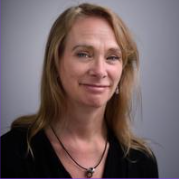The Executive Director of the Confederation of Open Access Repositories (COAR), Kathleen Shearer, shared insights on how COAR supports open access to research in Africa and ways African researchers and institutions can make their work more visible worldwide.
Watch the recording
The slides are available at https://africarxiv.ubuntunet.net/handle/1/1817
Speaker’s profile
Kathleen Shearer is the Executive Director of COAR (Confederation of Open Access Repositories) and a global leader in open access and open science. With nearly 20 years of experience, she has built a worldwide network of repositories and worked with organizations like UNESCO, LIBSENSE Africa, and the Research Data Alliance to advance open science. Kathleen has led key initiatives like COAR’s Next Generation Repositories and COAR Notify, setting new standards for repository functionality. Based in Montreal, Canada, her work has strengthened repositories as vital infrastructure for open science and supported diamond open access publishing.
Questions that were discussed during the Q&A session
What specific strategies does COAR employ to support open access repository managers in Africa, and how can African institutions leverage these efforts?
COAR (Confederation of Open Access Repositories) employs several targeted strategies to support repository managers across Africa, including:
- Capacity Building & Training: COAR organizes webinars, workshops, and training programs tailored to African institutions to enhance repository management skills, metadata standards, and policy development.
- Repository Support & Network Building: Through initiatives like the COAR Community Framework for Good Practices, African repositories can benchmark and improve their practices. COAR also helps foster regional networks that connect repository managers for peer learning.
- Technical Guidance: COAR provides practical guides on repository interoperability, usage statistics, and aligning with FAIR principles (Findable, Accessible, Interoperable, Reusable).
- Advocacy: COAR works with governments, funders, and institutions to advocate for policies supporting open access and repository infrastructure in the Global South.
African institutions can leverage these efforts by:
- Joining COAR’s network to access resources and peer support.
- Participating in capacity-building initiatives.
- Implementing COAR-aligned good practices to elevate the visibility and credibility of their repositories.
What are the biggest challenges facing African researchers and institutions in making their research outputs more globally visible, and how can COAR and AfricArXiv help address these challenges?
Major Challenges:
- Limited infrastructure: Many institutions lack robust digital repositories or the technical staff to manage them effectively.
- Metadata inconsistencies: Poor metadata quality reduces discoverability in global indexes.
- Funding constraints: Scarcity of resources affects publishing, digitizing, and maintaining open repositories.
- Language barriers: Most global research is published in English, sidelining valuable research in local languages.
- Lack of awareness: Many researchers remain unaware of open access benefits or options.
Role of COAR & AfricArXiv:
- COAR promotes repository interoperability and best practices, making African research more discoverable globally.
- AfricArXiv provides a free, inclusive, and multilingual preprint platform tailored to African researchers, improving early dissemination and visibility.
- Both support metadata harmonization, language inclusion, and capacity development, helping African research meet international standards.
Interoperability is a cornerstone of COAR’s mission. How can African repositories align with global standards to ensure their contributions are integrated into the wider research community?
African repositories can align with global standards through:
- Adopting International Metadata Schemas: Using standards like Dublin Core, OpenAIRE Guidelines, or Schema.org ensures machine-readability and indexing by global aggregators (e.g., CORE, OpenAIRE, Google Scholar).
- Implementing Persistent Identifiers: DOIs for content and ORCID iDs for authors help track and connect research outputs globally.
- Supporting Open Protocols: Enabling OAI-PMH for metadata harvesting ensures integration with global systems.
- Following FAIR Principles: Ensuring data is findable, accessible, interoperable, and reusable enhances visibility and reuse.
- Using Open Source Platforms: Platforms like DSpace, Invenio, and Dataverse, which support COAR recommendations, foster easier integration.
COAR provides guidance documents and community support to help repositories meet these standards.
What role do you envision for African research repositories in shaping the global research and open access landscape over the next decade?
African repositories can play a transformative role by:
- Decolonizing knowledge production: Repositories provide platforms for African-led research agendas, contributing local perspectives to global issues like climate change, public health, and sustainable development.
- Promoting linguistic and cultural diversity: With support for multilingual content, African repositories can challenge the dominance of English in academia.
- Driving innovation in open science: Facing unique challenges, African institutions often innovate out of necessity, contributing novel repository models, data sharing methods, and community engagement strategies.
- Forming equitable global partnerships: African repositories can advocate for more balanced and inclusive collaborations by asserting their place in global networks.
Can you share examples of successful collaborations or projects that COAR has been involved in within Africa, and what lessons can be learned from them for future partnerships?
Some notable COAR-related initiatives and partnerships in Africa include:
- Library Support for Embedded NREN Services and E-Resources Access (LIBSENSE): A collaborative project between COAR, WACREN, and other regional organizations to strengthen open science and repository infrastructure across Africa.
- Lessons learned: Importance of regional ownership, stakeholder engagement, and tailored approaches rather than one-size-fits-all models.
- AfricArXiv Collaboration: COAR supports AfricArXiv as part of the broader open science movement, promoting early dissemination and visibility of African scholarship.
- Training and Mentorship Programs: COAR has partnered with local institutions to provide in-region training on repository management and interoperability.
Key takeaways for future partnerships:
- Co-creation with local stakeholders ensures relevance and sustainability.
- Investment in human capital is as crucial as infrastructure.
- Multilingual and culturally sensitive approaches enhance inclusion and adoption.
About the webinar series
This webinar series is co-organized by: UbuntuNet Alliance: https://ubuntunet.net/ and Access 2 Perspectives: https://access2perspectives.org/ and supported by the African Open Science Platform (AOSP) https://aosp.org.za/

